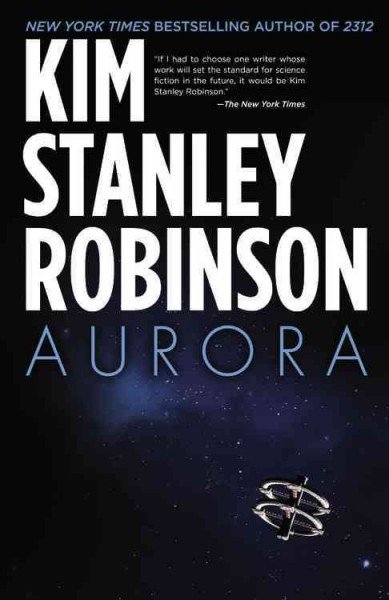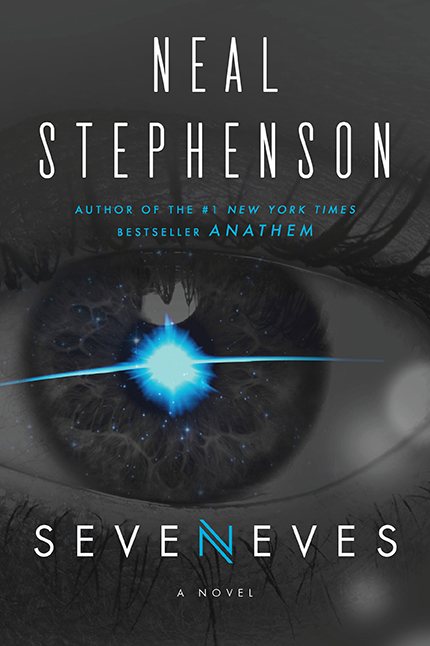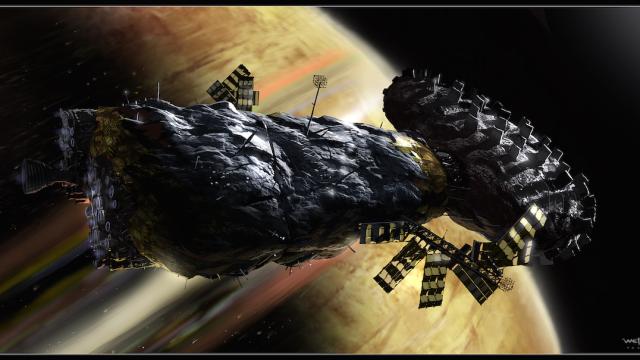Two of the most celebrated authors in science fiction, Kim Stanley Robinson and Neal Stephenson, released epic novels this summer about our future lives in space. And yet both Robinson’s Aurora and Stephenson’s Seveneves are actually about why we may never be able to leave Earth behind.
It’s not that these novels aren’t fantastic space operas with incredible, scientifically-accurate ships, thrilling near-death adventures, and breathtaking invocations of life beyond our rocky ball. But they are also cautionary tales about romanticizing space life, especially when our own planet is so perfectly suited to our evolutionary needs. They are about humanity’s awkward in-between stage, where our technology can take us to the stars but our biology still holds us back.

Maybe that’s a good thing. In Aurora, we follow the lives of people who are descended from a group of Mars One-like astronauts, who left Earth on a one-way ticket to the star Tau Ceti, where they hope to found the first colony beyond our solar system. Over a century after launch, the great-grandchildren of the original crew of are coping with all the unintended consequences of living on a generation ship.
Robinson offers us a fascinating view of what it means to live in a closed ecosystem, where every resource must be recycled and every environment must be minutely stabilised over and over again. The hopeful colonists living on the vessel known only as Ship must battle machine breakdowns, bacteria imbalances, food shortages, and even weirder (but completely plausible) problems like metal-eating microbes and water runoff in zero gravity areas.
As the community on Ship closes in on Tau Ceti, the group’s greatest scientist Devi struggles with how to maintain its failing ecosystems — including the human population itself, whose IQs and health is declining with each new ship-born generation. What’s fascinating here is that Robinson turns what is by all rights a space opera into a meditation on Earth science. To go to the stars, humans have to bring Earth with them. And that is the hardest problem.
Indeed, what Devi and her daughter Freya discover is that humanity may never be able to survive beyond Earth at all. Even all those Earthlike worlds we’ve seen in our telescopes possess strange qualities we’d never expect, which make it hostile to our Earth-optimised bodies. Aurora begins as a novel about the wonders of space travel but becomes, along the way, a novel about the primacy of home. The grand experiment of one space-mad generation has become something like child abuse for the people who never chose to be born in a giant terrarium. Even Ship itself, which has somehow achieved consciousness on the journey, is ultimately willing to sacrifice everything to return to the star system that birthed it.
But what would it mean for the crew of Ship to return to Earth? They are space people, born closer to Tau Ceti than to Sol. Why would Earth hold a lure for people who are space natives?
That’s also a question that Stephenson tackles in his novel Seveneves, which takes a more optimistic view of space life. But still, he winds up suggesting that there is something almost ineffable about Earth that calls out to humans — even ones who have evolved beyond Homo sapiens.

Seveneves begins with an intense, crazy space adventure. A force we don’t understand has shattered the Moon, and within two years its fragments will bombard Earth and reduce our planet to molten fire. A gang of astronauts, scientists, and randomly-chosen citizens of Earth are transplanted into a hastily-assembled fleet of space vessels that remain in orbit while the planet melts down. In the end, humanity has to reboot from just seven women who survive the white-knuckle ordeal, luckily with a futuristic biotech lab intact.
Five thousand years after the Moon is destroyed, a very different version of humanity has populated a massive ring of habitats around the Earth. These are the genetically-engineered, space-born descendants of the “seven eves,” those brave and slightly crazy women who managed to make it through the worst disaster humanity has ever known. They are altered enough that they probably wouldn’t qualify as Homo sapiens — and indeed, some of them have been engineered from Neanderthal DNA, while others are a chameleon-like subspecies that can evolve new traits literally overnight.
And they are all trying to lay claim to the newly-reborn Earth. For centuries, these space dwellers have been re-terraforming the ruined planet, bombarding it with water-rich comets that contain the building blocks of life. They have used all the preserved DNA from pre-disaster Earth to repopulate the planet with the closest approximation they can get to the animals and plants of our old ecosystems.
The results are, as Stephenson explains, literally intoxicating. One character drinks in Earth’s newly-oxygenated air, reeling, and yet can’t explain why she wants to live in this place that is utterly alien to all her experiences. Even for people born in space, who live in awe-inspiring structures of tremendous beauty and versatility, the planet is irresistible. Like Robinson’s characters in Aurora, these people yearn to return to a home that they have never known.
I asked earlier why that might be. The answer remains partly mysterious. Both writers have to depart from their typically rigorous scientific prose to answer with poetry, metaphysics, and pure romantic love. What makes Earth special? Certainly it’s where our bodies evolved to be at their most comfortable, but it’s more than that. Earth is at the center of our humanity, even when we are no longer Homo sapiens — even when we have cities in orbit and on other worlds.
Stephenson and Robinson evoke the promise of outer space, but they also suggest we will never leave Earth behind. This planet completes us.
Ultimately, Aurora and Seveneves do something extraordinary: they turn Earth into a planet we’ve never seen before. The characters in these novels don’t take Earth for granted — this blue marble is just as incredible as any new world would be, hurtling at a thousand miles per second around its blazing star. As we explore Earth from the perspective of human space beings, we realise that our planet is just as much a part of “outer space” as Saturn or Tau Ceti. Living well in space means living well on Earth, too.
As a famous inter-dimensional traveller once said, there’s no place like home. And that’s why two of the summer’s greatest space operas are about embracing and sustaining Earth.
